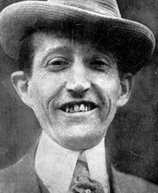Hoosier Watchdog?

Reflecting on Will Hays, one is tempted to recall the words of Teddy Roosevelt about Hays' fellow hoosier, Benjamin Harrison (the grandson of the man whom Hays was named after): "He is a cold-blooded, narrow-minded, prejudiced, obstinate, timid old psalm-singing Indianapolis politician."
Will Hays, who was born on this day in 1879 in Sullivan, Indiana, was a psalm-singer and an Indiana politician, but the resemblance ended there -- even if the reason he was hired by Hollywood was that the nation might imagine him to be the incarnation of the dour Benjamin Harrison, a righteous guardian of the morality of middle America. Hays, however, had a big flashy smile and an easy manner, and he was enough of a true-blue giddy fan of movie stars and movies to be trusted by the Hollywod moguls to play his part without much interference.
Hays was brought up in a strict environment in which his attorney father presented him with a specially written set of Presbyterian maxims to live by when the lad was but 14. He complied dutifully, and joined his father's law practice after his graduation from Wabash College in 1900. He rose rapidly through the ranks of the Indiana Republican Party organization, becoming chairman of the Republican National Committee in 1918. As Warren Harding's postmaster general (1921), he cleaned up the outfit and reduced overhead, but also ended arbitrary censorship of "radical" publications.
The following year, a battered motion picture industry, reeling from the bad publicity of the Fatty Arbuckle trials and threatened by the introduction of state censorship laws across the country, called upon the patriotic and pious but fair-minded Hays to be the ostensible "inside" censor and protector of the industry as chairman of the Motion Picture Producers and Distributors of America to help them head off regulation (a technique then only recently adopted by baseball, incidentally, in the guise of Kenesaw Mountain Landis).
Hays himself was more of a reassuring spokesman for the industry, refusing to get personally involved in the deletion of scenes. In the early years of his tenure, Hollywood got away with all manner of titillation -- "women [sitting] around with cigarettes in their mouths, in scanties and rolled stockings . . . They could be heard squealing in the next room during some pre-breakfast sexual routine" (per David Shipman) -- while Hays explained to citizens' groups that gangster movies proved that crime didn't pay, and that biblical films were uplifting despite showing scantily clad maidens. Only the middle America reaction to Mae West's frank and vaguely threatening fondness for sex left Hays without options, forcing him to adopt in 1934 a stricter code.
Hays was much more in his element as the consensus builder, and he was fairly successful in convincing producers to make "wholesome" movies which would appeal to Indiana Presbyterians. In his 22 years as chairman of the MPPDA, he succeeded in stemming the tide of state censorship, but after leaving the MPPDA in 1945, he lived long enough to hear (or at least hear about) the forbidden words "pregnant" and "virgin" being uttered in Otto Preminger's The Moon is Blue (1953). He died in his hometown of Sullivan in 1954.
Labels: Classic Cinema, Silent Film





0 Comments:
Post a Comment
Subscribe to Post Comments [Atom]
<< Home